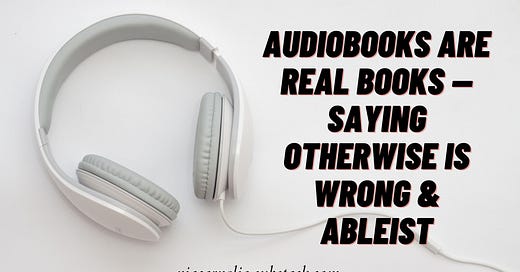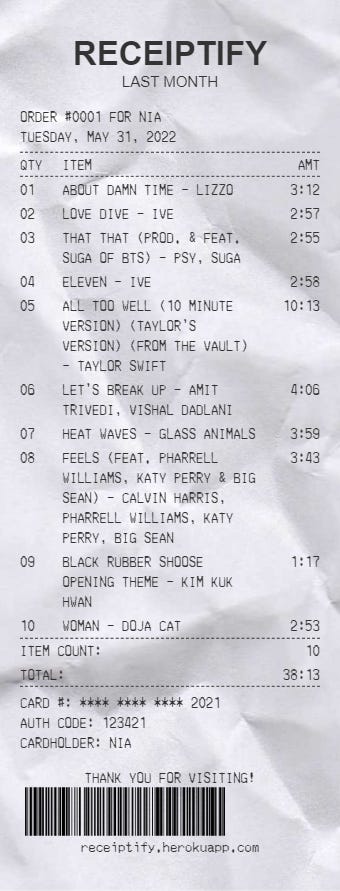Why we need to consider audiobooks 'real' books
Listening is the new reading — and it has been, for a while now.
Hello, hello! I know it's been a while. I was sick over two weekends, and on the third, I had a small holiday planned. Then, last week, I was battling an awful sore throat. Idk what's in the air, but I've just about had enough.
Before we get into today's edition, two important notes:
Those of you who signed up to receive my list of essential freelance writing newsletters should've all gotten it but if you haven't yet — please check spam!
Not Controversial (prev. Perceptive Madness) turned 1 on May 14, but we're gonna celebrate it on June 14 (bc of that aforementioned sickliness) so look out for the birthday issue then. We also hit 500+ awesome readers yesterday, so double celebrations next week!
Now, onto the real stuff:
This will show my age, but when I was younger, my parents bought me cassettes of stories that we played on our tape recorder. I remember being utterly entranced by the voices and the background effects and noises (pouring rains and cracking thunder during a thunderstorm part, winds gushing past trees, all so realistic) — I listened to the narrators and visualized whatever was happening in my mind.
Back then, it revolutionized story-telling for me. It was like a movie in my mind, except it was a silent movie, and neither was it a Nia-only production. I had a whole team filling in the sounds for me. For my parents, it was a bit of a breather from their daughter, who consumed books faster than they could buy them.
I'd largely forgotten about those cassettes with stories until I sat down to write this post. Now, of course, they're super common (in a different format) — audiobooks. Ironically, my attention span has been so warped by the digital age that I can only listen to 20 seconds of an audiobook before my mind wanders.
My personal consumption aside, audiobooks are HUGE now. People listen to them on the drives, on their train ride commutes, as they clean the house or do inane, mindless chores.
But still, we have the book snobs coming out of their home libraries to go — "audiobooks are not real books."

Today we're gonna dissect that from a literary and from a cultural perspective because not only is that statement wrong, but it's also extremely ableist.
Audiobooks are the original way of telling stories
If it's not the content (romance, graphic novels, anything but productivity and entrepreneurship books written by rich white folks), people like to make an unnecessary stink about the format you read in.
It took decades, a decrease in floor space, and the cheaper prices of digital books for people to be just about okay with reading ebooks. Still, you'll find the "it's not a real book if you can't sniff the paper" lot showing up on book twitter pretty often.
So what if I'm not 'reading' a book in a conventional sense? Times change, and things evolve. In fact, I could argue that audiobooks are the original way to tell stories. We began sharing stories orally before we wrote them down on cave walls, rocks (think God and Moses), animal skin (your basic parchment used by the Egyptians and a dozen other cultures), and finally, paper. We've been writing and telling stories for 30,000 years. We only invented printing a few centuries ago.
We moved from telling those stories to writing them down to preserve them, keep snippets of our history accessible to future generations, make sure the lessons we learnt weren't in vain and can help others, and in a way, to be able to reread those stories forever. But, of course, now that our technology has advanced enough, we can go back to our original way of consuming stories if that's what we prefer — we've certainly figured out how to make them accessible and store them for aeons, if not forever.


Our disabled friends deserve the joy of stories too
But I have a feeling this simplistic argument won't be enough for the elite readers because for them, saying something isn't a real book is a way of gatekeeping reading, of keeping the joy of stories to themselves. Because they're unable to think of those who are not like them, who might still want to enjoy stories.
Like many, many things in this world, Audiobooks were created for disabled people. Now, those who 'can' read 'normal' books might still choose to listen to an audiobook. Often, when we take our disabled friends into consideration when making things, we make things easier for ourselves, too (think about how you know where to cross the road even if there's no zebra crossing painted on — those raised spheres made for blind folks; think about your electric toothbrush — invented for those who couldn't move their hands properly; those cute bendy straws you like over the ramrod straight ones? Made for disabled folks).
Listening to stories is easier for blind people — that's the easiest disability to associate audiobooks to. And while they were created for blind people to begin with, now they're a blessing for those who can't hold books because of Multiple Sclerosis (MS) — a potentially disabling disease of the brain and spinal cord (central nervous system). Audiobooks are also great for dyslexic readers, making stories fun instead of stressful, and they're also an incredible resource for anyone trying to learn a new language.
So does the format matter, or does the joy of immersing yourself in a story matter more? As readers (of all kinds), we should be okay —more than okay, we should champion diverse ways of reading — because we all know how much fun books can be.
Also, by the logic of those who say audiobooks aren't real books — should we stop reading to kids who can't read yet? No more bedtime stories until you can read for yourself, eh?
Why is it important for audiobooks to be recognized as real books?
Usually, I'd tell you to tell anyone who said audiobooks aren't real books to fuck right off. But ignoring these book snobs doesn't do much good when it becomes an accessibility issue. For example, if someone were to tell me the smutty romance I'm reading isn't an actual book, I'd roll my eyes and continue reading because ideas like this won't really dent the romance fiction industry. It's just annoying, and we'll need to bring them off their high horse, but it won't do much harm because the demand for romance books continues to rise.
But while the demand for audiobooks grows higher, it's important for them to continue to be accessible at affordable prices, in libraries, through subscriptions, etc., because audiobooks might be the only way some can read. If the wrong person with power decides that audiobooks are frivolous and unnecessary, publishers may be forced to release fewer audiobook versions of print books, reducing the number of stories and books disabled folks can read.
At the moment, though, it seems like audiobooks are a growing and booming market.
The book industry (note how there's no "audiobook industry" as a separate entity) did $1.3 billion in audiobook sales in 2020 — a 12% increase from the previous year.
Here are some other notable findings from Publishers Weekly:
The percentage of Americans 18 and over who have ever listened to an audiobook is now 46%, up from 44% in 2020
Audiobook publishers produced 71,000 titles last year, up 39% over 2019.
Membership in audiobook services increased, with 38% of listeners indicating they subscribe to at least one such servicege
56% of audiobook listeners are under the age of 45, up from 52% in 2020 [Millenials and Gen Z for the win!]
70% of consumers agree audiobooks are a good choice for relaxing
So it's pretty clear that audiobooks are here to stay for the foreseeable future, so if the reading elites can cut their ableist language and stop dismissing them, that would be great, thanks!
P.S. Here’s a visual history of audiobooks if you’re interested. Did you know that Thomas Edison recorded the first audiobook in 1877?
What did you think of this issue?
Your anonymous feedback helps me improve. Thanks!
Nia's Newsletter Rec!
Ashley writes Crooked Reads, a monthly collection of 3 bite-sized reviews that follow a theme. The goal? You get the basic plot and how the book will make you feel — no verbose blurby words here.
Here's one of my recent fav issues:
Cool stuff to check out this week!
Resh (aka The Book Satchel) runs one of my favourite book blogs and bookstagram accounts. So I was more than honoured to make it to her list of 16 very cool internet newsletters to subscribe to. Do you follow any others on her list?
This doesn't seem to have rolled out to everyone yet (not to me, anyway), but now you can ditch Calendly because Google Calendar lets you set appointment (meeting) slots directly.
I recently watched Inglorious Basterds for the first time and was able to predict one of the plot points because I'd read this article about how the way you count on your fingers gives away your nationality. Interesting read.
Sometimes giving your friends advice is a bad idea — but here's a different way to help.
Bionic reading — can everything on the internet please be written like this? Like audiobooks, this has the potential to change the way read — for the better.
Essential pieces of work advice that you need to hear today.
A fun way to share what you've been vibing to. Here's my May playlist and my all-time favourites:
🎁 A surprise bonus link (please read all the replies too)!
Thanks for reading! Don’t forget to hit like and share this issue if you enjoyed it. 🖤
I’ll see you next week — maybe not at the same time, but definitely the same place.








I never thought audiobooks were inferior to print books -- so many of my childhood memories of reading are connected with someone who read aloud to me. I’ve not really met anyone who feels this way either but I do know several people, including my stepdaughter, with eye problems that make reading for long periods impossible. They love audiobooks. I really thing my first novel could have done better with an audiobook option and will be pushing for it with this next one.
I belong to several "bookish" Facebook groups and hardly a week goes by when someones posts something stupid like "are listening to audiobooks considered reading?" That comment lights up the FB group on both sides and the vitriol takes off. One would think that it was a hot topic political discussion going on instead of a discussion about bookish things.
Who the heck cares what the masses think about this subject. Our reading life is our own and if we want to consider listening to an audiobook as "reading" a book, then consider it and move on to the next audiobook that you can enjoy. I've never weighed in on this on the FB group as it would be like beating my head against a wall. Rant over. lol